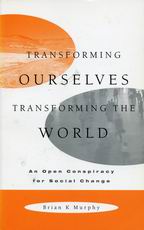
Transforming Ourselves Transforming the World
An Open Conspiracy for Social Change
Murphy, Brian K.
Publisher: Fernwood Publishing, Halifax, Canada
Year Published: 1999
Pages: 159pp ISBN: 1-55266-013-3
Library of Congress Number: HM831.M87Resource Type: Book
Cx Number: CX7687
Addresses society's pessimism about social change and provides a theoretical means and practice to overcome this fatalism.
Abstract:
Written for community workers, adult educators and social activists of all kinds, Murphy's book addresses society's pessimism about social change when confronting large corporations and government initiatives and provides a theoretical means and practice to overcome this fatalism. This theory and practice allow one to contribute to creating a human society defined by peace, justice and universal dignity. With a goal of deepening readers' understandings of the world and to empower them to take action for change, Murphy envisions an education which fosters authentic human learning and a unique paradigm he calls "open conspiracy. " The author notes how many young people grow up with false promises and a lack of hope since we as a society lack the motivation found in social movements of the past. Rather, activism only remains the means for those who strive to maintain optimism and human dignity despite the environment of negativity and the factors of greed and authoritarianism within global power holders which surround them. The theoretical bases for Murphy's argument are existentialism, critical theory, the liberationist education of Paulo Friere and social psychology.
Part 1 discusses the rationale and central ideas of the book including the social and personal dilemmas we face as activists and the problems preventing social change. Murphy analyses the latter from a perspective of physical and spiritual wholeness that he terms the "psychology of inertia." Chapter 3 questions how to confront this inertia in order to envision another way which brings this conceptualization into action. This Murphy labels as "human radicalism." Next in Part 2 he looks at human society and human beings as "possibilities in process." As an extension of this, Chapter 4 defines humans as the missing link between a deterministic past and an intentional and conscious future. Chapters 5, 6 and 7 establish the importance of imagination to activism, the need to confront fatalism so we can challenge the paradigms that justify the current human condition and outlines the type of education needed for critical and responsible social action: "democracy of intellect." Finally, Part 3 takes up the idea of "open conspiracy," where citizens come together in a public and broad based manner in various modes of action and reflection to transform the social order. The book concludes with the author's personal reflection on the writing process of his book and an epilogue which includes personal reflections both from himself and colleagues.
[Abstract by Amanpreet Dhami]
Table of Contents
Preface and Acknowledgements
Part I The Challenge
1 The Courage to Be
2 The Dilemma of Action and the Psychology of Inertia
3 Confronting the Dilemmas: Beyond Inertia
Part II Possibilities in Process
4 The Missing Link
5 The Individual, the Visionary
6 Challenging the Established Rationality
7 Imperatives for Modern Education
Part III The Open Conspiracy
8 The Open Conspiracy: Allies for Health and Action
9 Theatres and Strategies: Embracing the Future
10 Education and the Open Conspiracy
Conclusion
Epilogue Eclectic Notes on Knowledge and Action
Related Reading
Index
Subject Headings


